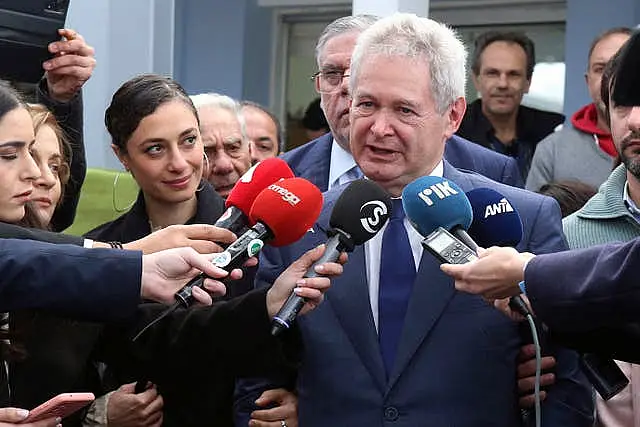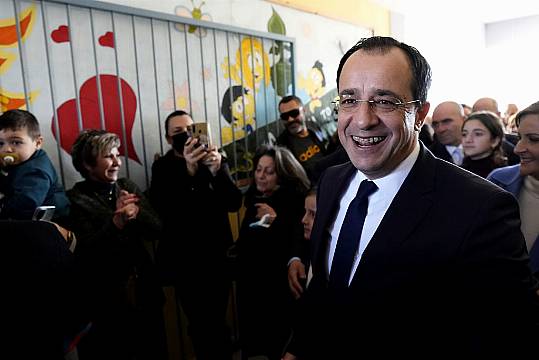Former foreign minister Nikos Christodoulides was elected as the new president of Cyprus in a run-off election on Sunday after his rival, veteran diplomat Andreas Mavroyiannis, conceded defeat.
With 99.5% of ballots counted, Christodoulides had 52% of the vote to Mr Mayroyiannis’ 48%, according to the official results.
Mr Christodoulides campaigned as a unifying force, eschewing ideological and party divisions. His message resonated with a wide swath of voters.
Mr Mavroyiannis positioned himself as the agent of change, ushering in a new political era following a decade of rule by the outgoing president, Nicos Anastasiades.

But Mavroyiannis’ support from the communist-rooted AKEL party may have pushed swing voters to Christodoulides.
Speaking to a sombre crowd of supporters, Mr Mavroyiannis, 66, who had served as the country’s ambassador to the United Nations, said he would not pursue an “active and daily role” in politics but remained willing to offer his counsel to the new government, if asked.
“I want to congratulate Nikos Christodoulides for his election victory and to wish more power to him,” Mr Mavroyiannis said. “I’m saddened that we couldn’t fulfil the hopes and expectations for a large progressive changes that our homeland needs.”
Exit polls had suggested Christodoulides swayed enough voters from the largest Democratic Rally (DISY) party, whose leader Averof Neophytou failed to make it into the run-off.

The DISY leadership decided not to formally back either candidate and left it to members to vote as they saw fit.
Many DISY party insiders had blamed Mr Christodoulides, a long-time party member, for running against Neophytou and splitting the party vote.
However, many do not want the communist-rooted AKEL, Mr Mavroyiannis’ main backer, from regaining a foothold in government and fear the diplomat becoming the next president of Cyprus would threaten the country’s fragile economy and pro-Western trajectory.
Critics fault AKEL for bringing Cyprus to the brink of bankruptcy a decade ago and for maintaining a pro-Moscow slant.
Mr Mavroyiannis had fended off suggestions that he would shape economic policies according to the directives of AKEL.
Amid the bickering within DISY, Mr Anastasiades, a former party leader, took the unusual step of issuing a statement suggesting that DISY members should work to thwart an AKEL-backed government.
He urged the party’s voters to safeguard the island’s Western orientation and its deepening alliance with the US and to maintain fiscal discipline while effectively dealing with an influx of migrants.
Some 561,000 citizens were eligible to vote and turnout for the runoff stood at 72.2%, marginally higher than in the first round of voting, according to official figures.
The new president will face the tough challenge of trying to revive stalemated peace talks with breakaway Turkish Cypriots, who declared independence nearly a decade after a 1974 Turkish invasion that followed a coup aiming at union with Greece.
Both Mr Christodoulides and Mr Mavroyiannis were key insiders during the last failed peace drive at a Swiss resort in 2017 as close confidantes of Mr Anastasiades.
Both have pointed to Turkey’s insistence on maintaining a permanent troop presence and military intervention rights in a reunified Cyprus as the main reason for the unravelling of negotiations.
Mr Christodoulides has said he draws the line at those two Turkish demands, while Mr Mavroyiannis softened his stance to woo left-wing voters who think more could have been done to reach a deal in Switzerland.
“Mr Christodoulides’ candidacy is an opportunity for Cypriot people to turn the page, with a new type of governance, with a humanist purpose above all else,” voter Neophytos Makrides, 58, said as he cast his ballot in Paphos.
“No to corruption and in favour of the right resolution of the Cypriot problem.”







